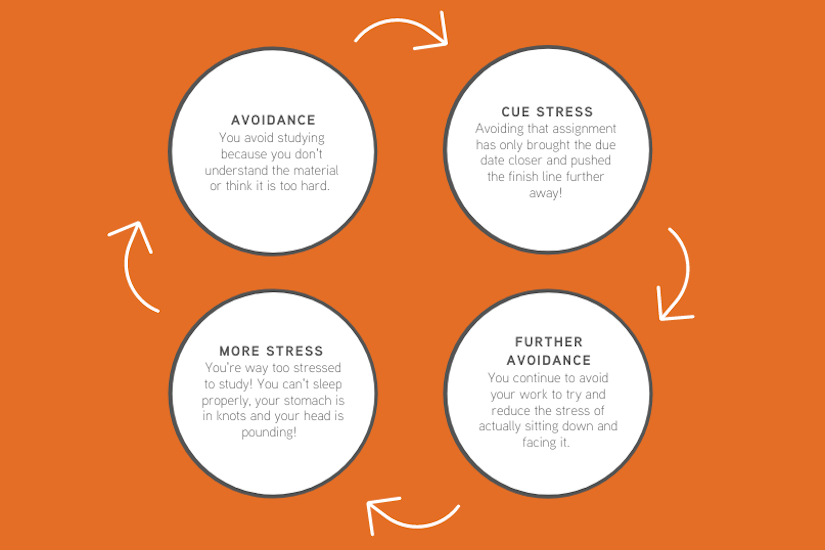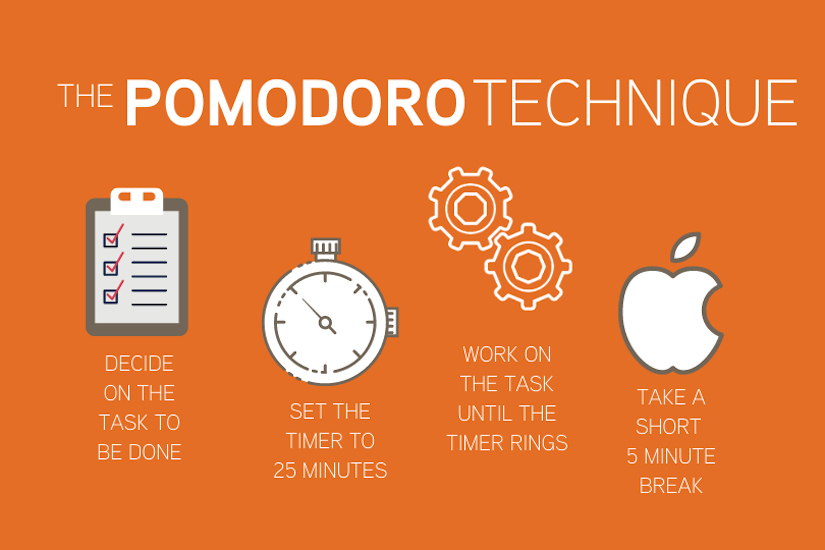The Avoidance Cycle. What is it and how to we avoid it?
14 Sep 2020
At some point in our lives we all find ourselves avoiding a certain task; be it at work, at home (putting away the clean clothes) or exercise. The same rings true for university studies. You put off doing your weekly readings, writing that essay or studying for an exam. Until the stress of accumulated tasks and deadlines gets too much, and avoidance simultaneously becomes your best friend and worst enemy!
Sometimes avoidance (AKA procrastination) can be, to a certain degree, helpful. Sometimes doing other mundane tasks that don’t require a lot of brainpower; like cleaning the kitchen, can help clear the blockages and sort out your thoughts on a particular topic. A bonus to this type of procrastination, you feel good that you have managed to get some housework done!
Procrasticleaning: The urge to clean one’s room, bathroom, or workspace fully knowing that something is far more important must be done in the near future because “it needed to be cleaned.” Usually occurs just before studying for a big test, writing a paper, or beginning some other undesirable yet significant task. Often justified by rationalising, “at least I am not being lazy.” – URBAN DICTIONARY
Productive or proactive procrastination is beneficial when you are doing something that, in the long run, doesn’t contribute to your stress levels. Get outside and get some fresh air, go for a walk, drink water and eat a healthy snack, or do some research to build up your knowledge base. Check out our CUC Life page for further productive procrastination ideas.

However, avoidance can become an issue when we get stuck in the pattern of avoiding our study for one reason or another; creating stress; leading to further avoidance and therefore, even greater levels of stress! Thus, creating our avoidance cycle.

Recognise Avoidance Behaviour
Learning to recognise when your avoidance becomes a hindrance, is crucial for not only success in your studies but your stress levels and overall health. One way to do this is by sitting down at the end of each day and reflecting on how you engaged in avoidance behaviours throughout your day. Avoidance behaviours could be minor things, such as not completing all your weekly discussion forum posts, or significant items, such as not starting your assignment that is due next week. Whatever they may be, when you start making a conscious effort to notice these behaviours, it will be a lot easier to change them.
Access support
Let your support network know of your study commitments, so they can help keep you motivated and accountable. This could include your family and close friends, people you work with, and our CUC Far West staff, who are here to support you in your academic journey specifically. Booking a study planning appointment with our Learning Skills Advisors is a great way to effectively time manage your studies. Our LSA’s are also available to support you with developing other fundamental study skills, such as how to research, plan your assignments and proofreading before submission. You can book directly with and LSA from our webpage here: Book time with an LSA
Have a study plan
When you sit down to do study, have a plan for that time. Saying “I am going to study” does not narrow down your focus for what you need to do, and most often than not, you end up spending your time with too many things taking your attention away from those specific tasks you need to be doing. Instead, write down a to-do list for that time period, of what you are going to do and focus on them one at a time. At the end of the day when you look back at all the things you have been able to ‘tick off’ your list, you will feel a greater sense of accomplishment and pride in yourself.
The Pomodoro technique is an evidence-based study method proven to increase concentration and productivity. By setting yourself a goal for a specific period of time (25 minutes) and having a short timed break (5 minutes), this method keeps you focused on your set task and gives your brain the ability to reboot attention and energy. You can download a Pomodoro Timer app or use an online timer such as www.pomofocus.io. The great thing about the Pomodoro technique is that you can customise the timer for what works best for you. For example, you may be more productive studying for 40 minutes with a 15-minute break.

Stress Management rather than Stress Avoidance
No matter who you are, or what degree you are completing, University study will inevitably cause stress. The key is to identify ways that you can manage those stressors rather than avoid them. A few simple stress management strategies that you can implement into your daily routine include: mindfulness, journaling, deep breathing exercises, positive thinking and gratefulness, getting adequate sleep each night, and ensuring that you are eating a balanced diet and doing regular exercise.

0 Comments
There are currently no comments, be the first to leave one